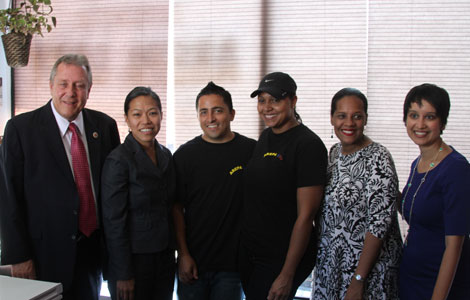5 ways to create stronger passwords
Updated: 2014-08-07 03:09
(Agencies)
|
||||||||
This week's news that a Russian crime ring has amassed some 1.2 billion username and password combinations makes now a good time to review ways to protect yourself online.
The hacking misdeeds were described in a New York Times story based on the findings of Hold Security, a Milwaukee firm that has a history of uncovering online security breaches.
Hold Security called the data "the largest known collection of stolen Internet credentials''. Hold's researchers did not identify the origins of the data or name the victim websites, citing nondisclosure agreements. The company also said it didn't want to name companies whose websites are still vulnerable to hacking, according to the Times report.
Hold Security didn't immediately respond to inquiries from The Associated Press.
If there's reason to believe any of your passwords might have been compromised, change them immediately. One of the best things you can do is to make sure your passwords are strong. Here are seven ways to fortify them:
Make your password long. The recommended minimum is eight characters, but 14 is better and 25 is even better than that. Some services have character limits on passwords, though.
Use combinations of letters and numbers, upper- and lowercase and symbols such as the exclamation mark. Some services won't let you do all of that, but try to vary it as much as you can. "PaSsWoRd!43" is far better than "password43".
Avoid words that are in dictionaries, even if you add some numbers and symbols. There are programs that can crack passwords by going through databases of known words. One trick is to add numbers in the middle of a word — as in "pas123swor456d'' instead of "password123456". Another way is to come up with a sentence and then use just the first letter of each word — as in "tqbfjotld'' for "the quick brown fox jumps over the lazy dog".
Substitute characters. For instance, use the number zero instead of the letter "O", or replace the "S" with a dollar sign.
Avoid easy-to-guess words, even if they aren't in the dictionary. You shouldn't use your name, company name or hometown, for instance. Avoid pets and relatives' names, too. Likewise, avoid things that can be looked up, such as your birthday or postal code. But you might use that as part of a complex password.
Try reversing your postal code or phone number and insert that into a string of letters. As a reminder, you should also avoid "password'' as the password, or consecutive keys on the keyboard, such as "1234'' or "qwerty".

 China Southern launches Guangzhou-New York service
China Southern launches Guangzhou-New York service
 NYC spurs small business
NYC spurs small business
 US-Africa summit starts with development fora
US-Africa summit starts with development fora
 Two double-decker buses collide in New York
Two double-decker buses collide in New York
 Life in quake-hit areas of Southwest China
Life in quake-hit areas of Southwest China
 Getting teachers to teach about China
Getting teachers to teach about China
 Drought persists in Central China's Henan province
Drought persists in Central China's Henan province
 US artist creates lifelike baby animals
US artist creates lifelike baby animals
Most Viewed
Editor's Picks

|

|

|

|

|

|
Today's Top News
Rescuers race to save lives as quake toll nears 600
589 dead as strong quake jolts SW China
China to punish Chrysler, Audi for anti-trust violations
US interest in Africa grows
Chinese firm developing Ebola reagent
Barrier lakes pose threat in quake-hit Ludian
2 Canadians probed in theft of State secrets
Envoy dismisses building freeze in S. China Sea
US Weekly

|

|







